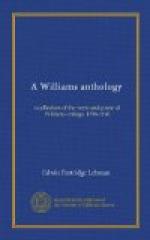This, like every other fine art, has something cosmopolitan in it. It eschews the local and narrow, refuses to belong to any sect or party, and appeals by the widest culture to men of culture. The dinner speeches of our own Bryant are thus liberal and catholic. So were those of Mr. Everett in the main, though one discovered the superb actor now and then arranging his robe or making use of his splendid presence and reputation to draw attention to himself. Of course, when such a man comes as a guest into a company somewhat foreign in thought and life to his own belongings, he can neglect the rules that good breeding imposes on those who compose the homogeneous circles and become narrow. But he must be narrow by praising not his own methods but the unexpected excellence of life found among his hosts—thus, while apparently dwarfing himself, he throws the dignity of his own reputation and history over that which he eulogizes and really exhibits the truest catholicity of spirit. To do this and perfectly conceal the satisfaction that one has, because he can do it, was perhaps difficult for Everett. Most men who heard him pardoned the failure. It was easier for Dickens. His life was in some sense less splendid but more real.
The amusement and good feeling which it is always the aim of the dinner speaker to create, were largely the aim of Dickens’ life. The humor, the knowledge of human nature, that he always had at command, were employed in his writings and daily thoughts to enliven and cheer men. No wonder then that his speeches are models of breadth and sweetness and appositeness, and that good judges regarded him when living as in this department of expression unrivalled.
He who is so guided by the love of letters engrafted on the love of man as to give constant and ample expression to these motives, will be neither a reformer without grace nor a scholar without manliness. Give to such a man a flow of animal spirits and a dash of wit, and he should be not unapt to entertain even when poised on the dangerous wing of an after-dinner speech.
Review, 1870.
THE STUDENT COMMUNITY
HAMILTON WRIGHT MABIE ’67
A very interesting and significant feature of university life in the early days was the great part played by students in the scholastic community. They were not only included in the group described by the word “faculty,” but they were charged with administrative and executive functions. The movement toward self-government, which has already borne fruit in many of our colleges, is in no sense a modern influence; it is a return to a condition widely prevalent in the early history of university organization. Not only did the students share, through various deliberative bodies, in the determination of the gravest questions of academic policy, but, in many cases, the executive head of the university was not only chosen by them




